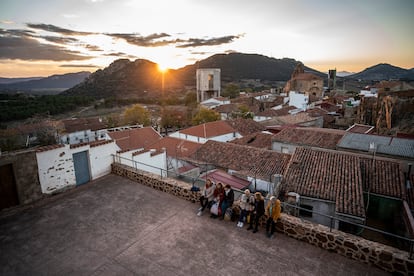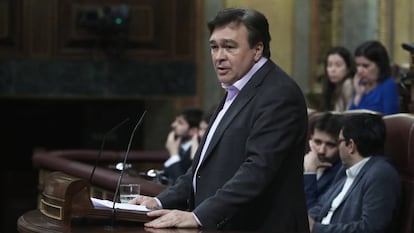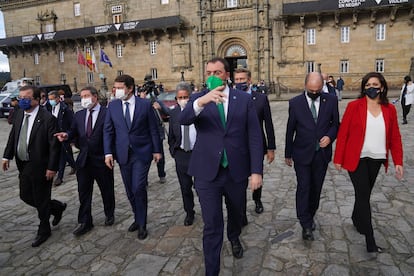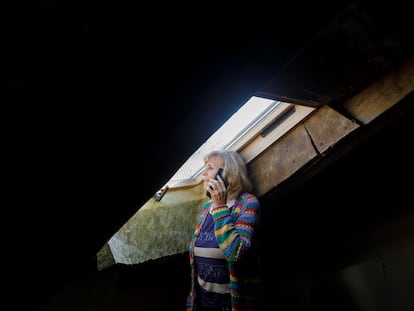How depopulation of rural areas is fueling political protest against ‘emptied Spain’
Encouraged by the parliamentary success of a tiny party named Teruel Exists, a new platform representing underfunded regions is getting ready to run in the next general election and start advocating for change

Outside a house in Almadén, in the province of Ciudad Real in Spain’s Castilla-La Mancha region, there are two apparently contradictory signs. One shows that the property is up for sale, and the other one says: “There’s a way out of the pit.”
“I have almost no neighbors anymore; they’ve all gone,” says Emilio Durán, 52. “The sign about the pit is a protest slogan we created to shake the region up, because there was once a mine here with 4,000 workers on the payroll. When they closed it, the state promised it would re-industrialize the area, but politicians only invest in places where there are votes to win and they haven’t done anything. There are no jobs, the young people are leaving, the elderly are dying and, as there are fewer and fewer of us, less money comes our way. It is a vicious circle,” he adds. Almadén had almost 13,500 inhabitants in 1960. Last year there were 5,200.
An ambulance driver, Emilio has decided to stay on and fight, as has Manuel Trujillo, 43, a businessman who wants his children to have “the opportunity to decide if they want to live here, in Madrid or in New York,” and there is also Maricarmen Sánchez, 64, the wife of a retired miner. Fed up with promises that have come to nothing, they all joined the citizen collective Forzados de Almadén, which claims to have 2,000 members in a region of 10,000 inhabitants. The group is part of the umbrella rural movement España Vaciada, or Emptied Spain, which brings together more than 150 such collectives. España Vaciada has its roots in local discontent and could grow into an electoral threat to the parties that have traditionally monopolized the majority of seats distributed in the smaller provinces.
The model: Teruel Existe

In 1999, an association called Teruel Existe (Teruel Exists) emerged to combat the depopulation of the province of Teruel in Aragón. Its members traveled to Brussels to air their grievances. They met with politicians of all persuasions. But they got tired of chasing them up and going to demonstrations. “Eventually, we realized that the only thing we were getting were reassuring words and pats on the back,” says Tomás Guitarte, now a member of parliament. “If we wanted to really influence politics, we had to be where the decisions were being made.”
In 2019 they ran for election, becoming the leading party in the province and winning three influential seats: one in Congress and two in the Senate. Teruel Existe’s vote was decisive in getting Pedro Sánchez of the Socialist Party (PSOE) confirmed as the new prime minister of Spain, in fact so much so that Guitarte claims to have received threats and more than 8,000 emails ahead of that vote. But Guitarte backed Sánchez after signing a national agreement that pledged repopulation measures for rural Spain, more infrastructure, the relocation of public agencies and institutions, and a commitment to creating a specific ministry to address the issue, now known as the Ministry for the Ecological Transition and the Demographic Challenge. “We achieved more in two years than in the previous 20,” he concludes.
Now, other provinces want to follow suit. “In many areas, either action is taken soon or the situation will be irreversible,” says Guitarte. “We have achieved social and political consensus on the problem. There are European recovery funds available and we cannot let this opportunity pass us by. That is why we have agreed to use politics as a tool. The better representation we have, the better off we will be. Our goal is for España Vaciada to have a parliamentary group because only with a presence in the institutions are words guaranteed to be turned into action.”
“Problem-solving first”
The names of the platforms that make up the movement España Vaciada say it all: Jaén Merece Más (Jaen Deserves More), León Ruge (León Roars), Cáceres Se Mueve (Cáceres Gets Moving) and so on. They are a kind of rural Indignados, mirroring the anti-austerity grassroots protest movement that emerged from the 2008 economic crisis. In some respects, these fledgling political platforms are reminiscent of the beginnings of leftist Podemos and center-right Ciudadanos (Citizens), two political parties that also had their roots in widespread discontent and initially promoted the idea of being “neither left wing nor right wing.” Most of the members of these rural platforms have no political experience beyond their neighborhood activism. In 2019, for instance, Emilio Durán locked himself, along with seven other men and three women, in the old Almadén mine for 11 days.
As Antonio Saz, España Vaciada’s coordinator, explains, “we have been robbed of our political discourse, which nowadays is used to set the left against the right instead of to improve people’s lives. Our members are very diverse and scattered, but we share the desire to change the country’s [political] model and we put this desire to solve our common problems ahead of ideology. More than 140 people from 22 provinces have agreed on a program built on specific measures. We are used to debating and negotiating and we will do so both with the PSOE and with the Popular Party [PP], with this government and with the next one, whatever its political stripes. And when our problems disappear, we will also disappear from the political scene.”
Emilio Durán adds, “we were ready to get into the first car that came to pick us up and that is why we talked to all the politicians, but they did not listen, so we decided to get behind the wheel and participate in politics ourselves.”
The formula will be decided in each province. According to Javier Domenech, from the Paisanos de Sancho (or, Friends of Sancho, a reference to rural platform in Ciudad Real, some associations believe that they gain nothing by going to Madrid and that a local spirit should prevail, but most of them want to follow Teruel Existe’s example and establish a presence in the capital.
The Spanish electoral system favors these small platforms, as it grants two fixed seats to each province of Spain except for the exclave cities of Ceuta and Melilla, in northern Africa, which get one each. The remaining 248 seats up for grabs are distributed according to population size. This means that less densely populated provinces have a higher representation. Sparsely populated places like Soria or Teruel have 2.2 seats per 100,000 inhabitants, while high-density provinces such as Seville, Valencia, Barcelona and Madrid have only 0.6 per 100,000, not even a third.
Doing the math
Imagine three new hypothetical parties: one that is national in scope, one focusing on the urban vote and a third one competing only in the least-populated provinces of Spain. EL PAÍS has simulated what would have happened if each of these parties had run in the general election of November 2019, each getting one million votes (4%), which are subtracted from the others. Although the number of votes would have been the same, their success in terms of congressional seats would have been very different.
The national party with votes across Spain would only obtain two lawmakers (0.6% of the total, 350). Most of its votes would be lost province by province, where it would not win a single seat. This is what happened to the United Left in 2008 and to Ciudadanos in 2019.
If the new party ran in the cities and had its voter base in the six most-populated provinces, with 4% of votes it would win about 10 seats (2.8% of 350). It would still have less than proportional representation, because these provinces distribute few seats compared to their dense populations.
But what happens to the party getting its votes in the least-populated areas of Spain? In this case, the same 4% of the total votes would give it up to 25 seats (7.1% of 350). The platform would have more seats for the same number of votes, because it benefits from the advantage the electoral system gives to sparsely populated provinces.
It is not an easy challenge, however. The party would need 20% of the votes in each province in which it is running, which would require it to be the third or fourth political force there. But the reward would also be big: a new political group with 10 or 20 seats would almost certainly be decisive in forming the next central government.
This kind of impact has already been felt by the parties currently in Congress. The leftist Más País needed 194,000 votes for each seat that it won, and Ciudadanos needed 165,000 votes for each of its seats, while the PP and PSOE won one seat for every 57,000 votes, more or less the same as the Basque Nationalist Party (PNV), the Canaries Coalition (CC) and the hard-left Basque party Bildu. But who won the most seats for their votes? Teruel Existe, which got one lawmaker with just 19,000 votes.
Representatives of the España Vaciada movement insist on the concept of “vaciada” rather than “vacía,” or “emptied” instead of simply “empty.” They mean to underscore that these parts of Spain once had a lot more people in them, and they want to recover what has been lost. This concept has boosted the movement, which extends beyond the semi-abandoned villages to include medium-sized cities and small provincial capitals. “The countryside is affected the most by the problem,” says Juan Manuel Camacho, 48, from Jaén Merece Más. “But in the end the cohesive factor is the grievances of provinces that have been traditionally forgotten. According to the Institute of Statistics and Cartography of Andalusia, the province of Jaén may lose up to 100,000 inhabitants before 2040. We have to reverse the situation. We do not want to end up like Soria or Teruel in 20 years.”
“In the last 25 years, the railway services have been dismantled in the area, we lack adequate electrical power and industries are leaving,” notes Camacho, who owns a family-run hotel. “Some parts of the country are getting more and more people, more infrastructure and more services at the expense of the other Spain that is not given any opportunities. What we are proposing is a territorial rebalancing act. This is more than a local movement, it is a model for the entire country.”
The impact on traditional parties
“In the short term, España Vaciada may be successful because there is a demand for it and because of the immense political volatility that exists right now,” says Belén Barreiro, director of the Madrid-based data analysis firm 40dB. “But I doubt it will be successful in the long term because digitalization means that the gap between urban and rural areas is getting narrower each year. Everything is possible in the current climate. We have gone through the crisis and seen the collapse of the two-party system, the birth of new parties and now the polls show a strengthening of both the PP and PSOE, which together have more votes than they had in 2015.”
In 2019, the parties that won the most seats in the small provinces were the PSOE (42) and the PP (34), ahead of the far-right Vox (14) and the left-wing Unidas Podemos (three). The two big parties are, therefore, the ones that have the most to lose in these rural areas.
José Pablo Ferrándiz, from Elemental Research, believes that the scenario is “very complex,” but that getting into parliament would be “a very good result” for the rural platforms and that it makes sense for them to try because in such a fragmented political scenario, “a small party can make significant gains in exchange for their vote.”
In any case, Ferrándiz believes that it is “a wake-up call” for the traditional parties and that it could trigger changes, as the Indignados movement did in 2011 and 2012, in the internal workings of the big parties. “For example, when it comes to choosing the candidate for those provinces, they will have to be more involved at ground level in the area,” he points out. “The España Vaciada movement is also questioning the role of the Senate as a territorial chamber, as these groups have realized that a seat in Congress is more useful to them, giving them as it does more capacity to pressure and negotiate.”
But political scientist Pablo Simón believes it is too early to calculate the movement’s impact. “There are two years left [before the next general election] and they are very heterogeneous groups,” he says. “In the 1980s, many small and regional parties emerged because the conservative Alianza Popular, which was the genesis for the PP, was not very competitive. At that time there was very little polarization and competition. Now both are high and, in this context, when it comes to voting, people who thought they might support a local party often end up supporting a traditional party instead.”
The reaction of the PSOE and the PP

The PP and the PSOE are blaming each other for the protests from depopulated parts of Spain. Javier Izquierdo, the PSOE’s secretary for Strategy and Electoral Action, says: “With [former prime minister José Luis Rodríguez] Zapatero there were specific plans for Teruel and Soria..., but when the PP came to power, these were halted.” Milagros Marcos, secretary for agricultural and population affairs for the PP, meanwhile, believes that the discontent in these areas is the result “of the PSOE abandoning them. They paralyzed all our initiatives,” she says.
“We are aware that we have to promote balance in the country,” says Izquierdo. “And the government is implementing many policies to tackle the demographic challenge, such as decentralizing government agency headquarters, appointing a deputy PM to oversee these matters, drafting a specific plan with 130 cross-regional measures, and a commitment to provide more than 100 megabits of broadband in 2025 to the whole of Spain. It is a national problem, not a local one.”
Marcos, from the PP, says that one of the key issues for these areas is “sustainable livestock farming, investment in irrigation and tax incentives at all levels to make them more attractive for both companies and inhabitants.”
Asked if they fear that these rural platforms will harm their own parties in the next elections, Izquierdo says that they are convinced of their “strength” and that the measures adopted “will be visible.” But Marcos insists that in order to solve the problem, national leadership is required and that these smaller parties are really like generic brands of the PSOE. “The PSOE knows that its own brand has worn thin from all the damage they have done, such as demonizing livestock breeders and meat consumption, for example. But they can get these platforms to support them in power, such as Teruel Existe, which [through its support at the investiture vote] has achieved nothing more than putting [Pedro] Sánchez at the helm of government.”
Regions come together for more funding
In a rare display of cross-party agreement, the premiers of the eight least-populated regions of Spain, representing the PSOE, the PP and a small party from Cantabria, met in Santiago de Compostela on Tuesday to draft a joint proposal for a new financing model. These regions represent 62% of the territory and are home to around a quarter of the Spanish population (11.5 million out of 47 million).
Galician premier Alberto Núñez Feijóo, of the PP, who hosted the event, said that the spirit of the gathering was to achieve agreements across party lines. Securing more state funding to cover essential needs in their regions will require assigning more weight to certain factors that are now largely overlooked, such as scattered population patterns or a challenging geography that makes it especially difficult to deliver services. Regional leaders say they want more funding for health, education and social services.
“The starting point is that nobody should walk out of the talks with less money than they walked in with,” said Aragón premier Javier Lambán, who estimated that an additional €17 billion in funding will be required to cover the demands of all the regions.
Despite the show of unity, the leaders of the eight regions – Aragón, Asturias, Castilla-La Mancha, Extremadura, La Rioja, Castilla y León, Galicia and Cantabria – want to avoid being seen as a united front that might antagonize their respective party leaderships. “Today the news is not about squabbling and political noise, it’s about finding common ground and dialogue,” said Núñez Feijóo.
More information








































